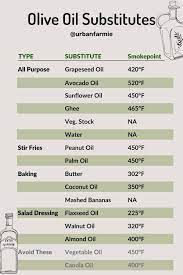The Best Substitutes for Olive Oil for Cooking and Beyond
Known for its rich flavor and numerous health benefits, olive oil has long been a staple in kitchens around the world. However, if you’re looking to change things up or prefer to explore different options, there are plenty of alternatives that offer unique flavors and additional health benefits.
Avocado oil is one such alternative that has gained popularity in recent years. It shares many of the same heart-healthy benefits as olive oil, but with a higher smoke point, making it ideal for high-heat cooking methods like stir-frying and grilling. Avocado oil also has a buttery taste and smooth texture that can enhance the flavor of your dishes.
Coconut oil is another versatile substitute that adds a tropical twist to your meals. It contains a unique type of fat called medium-chain triglycerides (MCTs), which can provide a quick source of energy. Coconut oil has a sweet, nutty flavor and pairs well with both sweet and savory dishes. It can be used in baking, stir-frying, and even as a dairy-free replacement for butter in some recipes.
Grapeseed oil is an excellent option for those looking for a milder flavor. It has a high smoke point and a neutral taste, making it suitable for a wide variety of cooking methods. Grapeseed oil is also rich in vitamin E, which plays a crucial role in maintaining healthy skin and hair. Its light texture and subtle flavor make it a popular choice among chefs and home cooks alike.
These are just a few alternatives to olive oil that offer their own unique flavors and health benefits. Whether you’re looking to experiment with new recipes or simply want to change up your cooking routine, exploring different types of oils can add excitement and variety to your meals.
Top Alternatives to Olive Oil:
While olive oil is a popular choice for cooking and dressing, there are plenty of other healthy and delicious alternatives to consider. These alternatives offer a variety of flavors and health benefits, making them a great addition to any kitchen. Whether you’re looking for a different taste or a specific health benefit, here are some top alternatives to olive oil:
1. Avocado Oil
Avocado oil is rich in monounsaturated fats, which can help lower cholesterol levels. It also has a high smoke point, making it a great option for cooking at high temperatures. With its creamy texture and mild flavor, avocado oil is a versatile substitute for olive oil.
2. Coconut Oil
Coconut oil is known for its natural sweetness and tropical flavor. It contains medium-chain triglycerides (MCTs) that can boost metabolism and provide quick energy. Coconut oil is great for baking, sautéing, and even in smoothies.
3. Almond Oil
Almond oil is a great option for those with nut allergies or who prefer a milder taste. It contains vitamin E and monounsaturated fats, which can promote heart health. Almond oil works well in salad dressings and light sautéing.
Other alternatives to consider include sesame oil, grapeseed oil, and walnut oil. Each of these oils offers its own unique flavor and health benefits. Experimenting with different oils can add variety to your dishes and help you find new favorites.
Remember to consider your cooking method and flavor preferences when choosing an alternative to olive oil. Whether you’re looking for a healthier option or simply want to switch up your usual ingredients, these alternatives are worth exploring.
Avocado oil:
Avocado oil is another great alternative to olive oil. It is made from the fruit of the avocado tree and has a mild flavor that pairs well with a variety of dishes. Like olive oil, avocado oil is rich in monounsaturated fats, which are heart-healthy fats that can help lower bad cholesterol levels and reduce the risk of heart disease.
In addition to being a healthy option, avocado oil also has a high smoke point, making it suitable for high-heat cooking methods like frying and sautéing. Its smooth and buttery texture adds a luxurious touch to dishes, making it a popular choice among chefs and home cooks alike.
Avocado oil is also packed with nutrients, including vitamin E, potassium, and antioxidants, which can help support a healthy immune system and overall well-being. It is also believed to have anti-inflammatory properties that can benefit those with inflammatory conditions, such as arthritis.
Whether you use it as a salad dressing, a cooking oil, or a drizzle over grilled vegetables, avocado oil is a versatile and delicious alternative to olive oil that offers numerous health benefits.
Coconut oil:
Coconut oil is a popular alternative to olive oil, known for its versatility and health benefits. Produced from the meat of mature coconuts, it has a rich and pleasant taste that adds a unique flavor to dishes.
One of the greatest advantages of coconut oil is its high smoke point, which makes it ideal for cooking at high temperatures. Unlike olive oil, which has a lower smoke point, coconut oil can withstand heat without breaking down and releasing harmful substances.
In addition to its culinary uses, coconut oil is also widely used in skincare and haircare products. Its moisturizing properties make it an excellent natural conditioner for the hair, and it is often included in shampoos, conditioners, and hair masks. Coconut oil is also known for its potential antimicrobial and acne-fighting properties when used topically on the skin.
Health benefits of coconut oil:
Coconut oil is rich in healthy fats, particularly medium-chain triglycerides (MCTs), which are easily metabolized by the body and provide a quick source of energy. Studies have suggested that MCTs may help with weight loss and improve brain function.
Coconut oil also contains lauric acid, a fatty acid that has been shown to have antimicrobial and antiviral properties. It may help boost the immune system and fight against harmful microorganisms.
How to use coconut oil:
Coconut oil can be used in a variety of ways in the kitchen. It is an excellent choice for frying, sautéing, and baking, as it adds a subtle coconut flavor to the dishes. It can also be used as a spread or substitute for butter in recipes.
When using coconut oil in recipes, it is important to note that it solidifies at temperatures below 76 degrees Fahrenheit (24 degrees Celsius). To melt the oil, simply place the desired amount in a microwave-safe bowl and heat for a few seconds or place the jar in warm water until it becomes liquid.
Overall, coconut oil is a versatile and flavorful alternative to olive oil, offering a range of health benefits and culinary uses. Whether used in cooking or skincare, it can bring a tropical twist to your dishes and beauty routine.
Sesame oil:
Sesame oil is a popular alternative to olive oil that is often used in Asian cooking. It has a rich, nutty flavor and a high smoke point, making it suitable for frying, stir-frying, and sautéing.
One of the key benefits of sesame oil is its high antioxidant content. Sesame oil is rich in an antioxidant called sesamol, which has been shown to have anti-inflammatory and anti-cancer properties. Additionally, sesame oil contains vitamin E, which is a powerful antioxidant that helps protect cells from damage.
Another advantage of sesame oil is its potential to improve heart health. Studies have found that consuming sesame oil can help reduce blood pressure, lower cholesterol levels, and improve overall cardiovascular health.
Uses of Sesame oil:
- Cooking: Sesame oil is commonly used as a flavor enhancer in various dishes. It can be used in marinades, dressings, and sauces to add a unique taste to the food.
- Asian cuisine: Sesame oil is a staple ingredient in many Asian cuisines, including Chinese, Japanese, Korean, and Thai. It is often used in dishes such as stir-fries, noodles, and fried rice.
- Salad dressing: Sesame oil can be mixed with other ingredients like soy sauce, vinegar, and ginger to create a delicious and flavorful salad dressing.
Health considerations:
While sesame oil is generally considered healthy, it is high in calories and fat. Therefore, it should be consumed in moderation, especially if you are watching your calorie intake or trying to lose weight.
It is worth noting that sesame oil has a strong flavor, so it may not be suitable for all dishes. It is recommended to use it in recipes that can complement its nutty taste.
If you have a sesame allergy or sensitivity, it is important to avoid sesame oil and opt for a different alternative.
Grapeseed oil:
Grapeseed oil is another popular alternative to olive oil that is commonly used in cooking and baking. It is made from the seeds of grapes and has a high smoke point, making it suitable for various cooking methods, including sautéing, stir-frying, and even deep-frying.
Grapeseed oil is known for its mild flavor, which allows it to blend well with other ingredients without overpowering the dish. It has a subtle nutty taste that adds a delicate touch to salads, marinades, and dressings.
One of the main benefits of grapeseed oil is its high concentration of polyunsaturated fats, particularly omega-6 fatty acids. These healthy fats can help lower bad cholesterol levels and reduce the risk of heart disease. Grapeseed oil is also rich in vitamin E, an antioxidant that promotes healthy skin and hair.
Health benefits of grapeseed oil:
1. Good for the Heart: Due to its high content of omega-6 fatty acids, grapeseed oil can help improve heart health by reducing inflammation and lowering LDL cholesterol levels.
2. Anti-Aging Properties: The vitamin E present in grapeseed oil helps protect the skin against damage caused by free radicals, promoting a youthful complexion.
3. Light and Versatile: Grapeseed oil has a light texture and neutral flavor, making it an excellent all-purpose cooking oil that can be used in a wide range of recipes.
With its numerous health benefits and versatility, grapeseed oil is a great alternative to olive oil. Try using it in your favorite dishes to add a subtle hint of flavor and reap the health rewards.
Walnut oil:
Walnut oil is another healthy and delicious alternative to olive oil. It is a great source of omega-3 fatty acids, which are essential for brain health and reducing inflammation in the body. Walnut oil has a rich and nutty flavor that adds depth to any dish.
Here are some ways you can use walnut oil:
1. Salad Dressing:
Walnut oil can be used as a base for homemade salad dressings. Its distinct flavor pairs well with leafy greens, fruits, and nuts, creating a well-balanced and flavorful dressing.
2. Drizzled over roasted vegetables:
After roasting your favorite vegetables, drizzle some walnut oil over them to enhance their flavor. The oil will add a nutty taste and make the vegetables more aromatic.
3. Baking:
Walnut oil can be used in baking as a substitute for vegetable oil or butter. It works well in cakes, muffins, and cookies, adding a unique taste to your baked goods.
When using walnut oil, it’s important to remember that it has a lower smoke point compared to olive oil. This means that it is better suited for low to medium heat cooking methods such as sautéing, stir-frying, and baking.
So, if you’re looking for a healthier and delicious alternative to olive oil, give walnut oil a try. Its nutty flavor and nutritional benefits make it a versatile and flavorful addition to your kitchen.
Flaxseed oil:
Flaxseed oil is an excellent alternative to olive oil, providing a unique and nutty flavor to dishes. Derived from the seeds of the flax plant, this oil is rich in omega-3 fatty acids, which are beneficial for heart health.
One of the key benefits of flaxseed oil is its high concentration of alpha-linolenic acid (ALA), an essential fatty acid that the body cannot produce on its own. In addition to supporting heart health, ALA has anti-inflammatory properties and can help lower cholesterol levels.
Flaxseed oil is also a good source of lignans, a type of antioxidant that may have protective effects against certain types of cancer. These lignans have also been associated with improved digestive health and reduced menopausal symptoms.
“FAQ:” Substitute for olive oil
What is a suitable substitute for olive oil when cooking, and how does canola oil compare in terms of flavor and application?
A suitable substitute for olive oil is canola oil. Canola oil has a mild flavor and can be used in various cooking applications without significantly altering the taste of the dish.
In the absence of olive oil, what alternative option can be used as a cooking oil, and how does sunflower oil differ from olive oil in terms of flavor and use?
Sunflower oil is a suitable alternative to olive oil for cooking. It has a neutral flavor, making it versatile, and it can be used in various cooking methods without imparting a distinct taste to the food.
When considering alternatives to olive oil, what is a good substitute, and how does peanut oil compare in terms of flavor and suitability for different types of cooking?
Peanut oil is a good substitute for olive oil, providing a slightly nutty flavor. It is suitable for high-heat cooking methods like frying due to its high smoke point.
In situations where extra virgin olive oil is unavailable, what can be used as a substitute, and how does a neutral oil compare to extra virgin olive oil in terms of flavor and application?
A neutral oil, such as grapeseed or vegetable oil, can be used as a substitute for extra virgin olive oil. Unlike extra virgin olive oil, neutral oils have a milder flavor and are often used in recipes where a more subtle taste is desired.
What is a practical solution when you run out of olive oil, and how can you choose an appropriate substitute from commonly available cooking oils?
If you run out of olive oil, selecting a neutral oil like canola or sunflower oil is a practical solution. These oils can seamlessly replace olive oil in various recipes without significantly impacting the final dish’s flavor.
What is considered a healthy oil, and why is it important to choose oils with beneficial nutritional profiles?
Olive oil is considered a healthy oil due to its monounsaturated fats, which are associated with various health benefits. Choosing oils with favorable nutritional profiles is crucial for promoting overall well-being.
When seeking the best olive oil, what factors should be considered, and how can one identify high-quality olive oil?
The best olive oil is identified by factors such as the source of olives, production methods, and the designation of extra virgin. High-quality olive oil is often characterized by a rich flavor, low acidity, and adherence to strict production standards.
Which oil has a high smoke point, and why is this characteristic important when choosing cooking oils?
Refined coconut oil is known for having a high smoke point. A high smoke point is crucial when selecting cooking oils as it determines the temperature at which the oil can be safely used without producing harmful compounds.
What are some alternatives to palm oil, and why do people seek substitutes for palm oil in their cooking?
Alternatives to palm oil include oils like coconut, sunflower, or canola oil. People seek substitutes for palm oil due to environmental concerns, as the production of palm oil has been associated with deforestation and habitat destruction.
In what way is avocado oil a good source of nutrition, and why is it considered a healthier alternative to some other oils?
Avocado oil is a good source of monounsaturated fats and is considered a healthier alternative to certain oils due to its nutritional profile. It offers heart-healthy fats and has a higher smoke point than olive oil.
When considering the temperature at which oil is used, why is it important to match the cooking method with an oil’s smoke point?
Matching the cooking method with an oil’s smoke point is crucial to prevent the oil from breaking down and producing harmful substances. Using an oil with an appropriate smoke point ensures safe and effective cooking.
What are some versatile oils that can be used in place of olive oil, and how do they compare in terms of flavor and application?
Refined coconut oil, sunflower oil, and canola oil are versatile oils that can replace olive oil. They have milder flavors and can be used in various culinary applications without overpowering the dish.
When olive oil isn’t available, what oil can be used as a suitable alternative, and how does it compare to olive oil in terms of taste and functionality?
Refined olive oil can be used as a suitable alternative when extra virgin olive oil isn’t available. It has a milder taste and is versatile in cooking applications.
What makes flaxseed oil a great choice as an alternative to olive oil, and in what types of dishes can flaxseed oil be effectively used?
Flaxseed oil is a great alternative to olive oil due to its omega-3 fatty acids. It can be effectively used in salads, dressings, or as a finishing oil to add a nutty flavor and enhance nutritional value.
When seeking an alternative to olive oil, how does almond oil stand out, and what are its unique characteristics in terms of taste and application?
Almond oil offers a mild and slightly sweet taste, making it a unique alternative to olive oil. It works well in both cooking and as a finishing oil, adding a subtle nuttiness to dishes.




